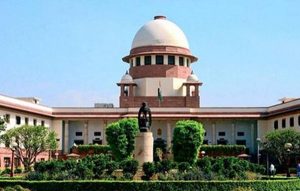 The Hon’ble Supreme Court in the case of UNION OF INDIA & ORS. VERSUS M/S. HCC VCCL JOINT VENTURE vide Special Leave Petition (Civil) Diary No(s). 24660/2025 dated 09.07.2025, reiterates the principle of natural justice and procedural fairness, holding that mere invocation of a statutory provision like Section 108 is not sufficient—there must be a speaking order showing that the authority applied its mind before interfering with an already passed refund sanction order. Refunds cannot be held in abeyance indefinitely based on vague or unreasoned directions.
The Hon’ble Supreme Court in the case of UNION OF INDIA & ORS. VERSUS M/S. HCC VCCL JOINT VENTURE vide Special Leave Petition (Civil) Diary No(s). 24660/2025 dated 09.07.2025, reiterates the principle of natural justice and procedural fairness, holding that mere invocation of a statutory provision like Section 108 is not sufficient—there must be a speaking order showing that the authority applied its mind before interfering with an already passed refund sanction order. Refunds cannot be held in abeyance indefinitely based on vague or unreasoned directions.
Facts of the Case: In this case, the petitioner had filed refund claims under the provisions of the CGST Act, 2017. A refund sanction order dated 09.12.2022 was passed in favour of the petitioner, presumably allowing refund based on the eligibility of input tax credit (ITC).
However, subsequently, the refund sanction order was kept in abeyance by the Commissioner by invoking Section 108 of the CGST Act, which deals with revision of orders by the revisional authority. The order placing the refund in abeyance did not record any finding or reasoning to show why the earlier refund order was considered unsustainable or erroneous in law.
The petitioner challenged this abeyance order before the Delhi High Court, which in its order dated 09.12.2022, held that the Commissioner’s action to be unsustainable due to absence of recorded reasons or any findings indicating a prima facie case of illegality in the original sanction order, as required under Section 108 of the CGST Act. Thus, the High Court quashed the order withholding the refund and directed the Revenue to release the refund amount.
The Union of India challenged the High Court order by filing a Special Leave Petition (SLP) before the Supreme Court.
Issue: Whether the refund sanction order passed under the CGST Act can be placed in abeyance under Section 108 without the Commissioner recording reasons or forming a prima facie opinion that the original order was erroneous, illegal, or unsustainable.
Decision of High Court: The High Court held that Section 108 empowers the Commissioner to revise orders only when he is of the opinion that the decision or order is erroneous in law or prejudicial to the interest of revenue.
In the present case, no such findings or reasons were recorded by the Commissioner to justify invoking the revisionary jurisdiction under Section 108.
The order merely placing the refund in abeyance, without arriving at any conclusion or forming a proper opinion, is unsustainable in law.
The High Court ruled in favour of the petitioner, setting aside the order keeping the refund in abeyance.
Decision of Supreme Court: The Supreme Court refused to interfere with the Delhi High Court’s judgment, upholding the reasoning that the Revenue cannot withhold refund without a valid order or finding.
The Court dismissed the SLP, stating “We see absolutely no reason to interfere with the order of the High Court, in exercise of our jurisdiction under Article 136 of the Constitution of India.”
However, it kept the question of law open, meaning the Revenue may raise the issue in appropriate future cases. The Court also condoned delay in filing the SLP.
To read the complete Supreme Court judgment 2025 Taxo.online 1469


